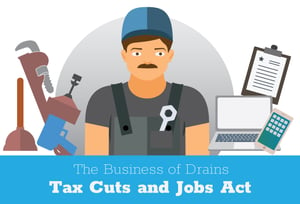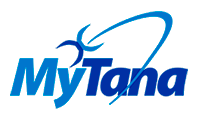 In December 2017, the Tax Cuts and Jobs Act (TCJA) passed, giving small businesses such as plumbing and drain cleaning operations access to some beneficial tax code changes. In print, the TCJA runs 274 pages—too long to outline in a blog. However, the essential changes include
In December 2017, the Tax Cuts and Jobs Act (TCJA) passed, giving small businesses such as plumbing and drain cleaning operations access to some beneficial tax code changes. In print, the TCJA runs 274 pages—too long to outline in a blog. However, the essential changes include
- Reduced income tax rates
- A nearly doubled standard deduction
- New limitations on itemized deductions
- Reforms to several other provisions
Most of these changes will expire in 2025, so you should take advantage of these tax policies as soon as you can. They can can have a lasting impact on your business.
Here are a few major changes that took place with the TCJA that are important to note:
Corporate tax rate changed. If your plumbing or drain cleaning business is registered as a C-corporation, then you will apply a single rate of 21% to your taxable income for the corporation. The new rate is also a flat tax, meaning it’s the same for all C-corporations. This is different from years past when the corporate tax rates had different brackets and could be taxed at 15, 25, 34 or 35 percent. Learn more about this tax change in the article 4 Big Tax Law Changes That Will Impact Business Owners in 2018 by Northwestern Mutual.
The pass-through rate has changed. Tax cuts became larger for businesses—big and small. There is now a 20% deduction on self-employed income on net business income. This new law is called the Section 199A deduction, or the Qualified Business Income Deduction. With this deduction, pass-through entities, including partnerships, S-corporation shareholders, limited liability corporations (LLCs) and sole proprietors can keep a bigger chunk of their earnings tax-free.
Simply put, depending on the structure of their business, some business owners pay taxes on their businesses’ profits and then are taxed again when their income shows up on their personal returns. For example: Your plumbing business is an S-Corporation and you have calculated your profits to be $120,000 for 2018 before taking a salary of $50,000. To calculate the 20% deduction, your qualified business income is $70,000 ($120,000-$50,000). You now have a deduction of $14,000 (20% x $70,000) to apply to your personal tax return. The deduction is applied on your personal tax return, because pass-through taxation models apply taxes at the personal income level, not the business income level.
Want to learn more? Check out the article The 20% Pass-Through Tax Deduction for Business Owners by Nolo.
Changes in standard deduction. The 2018 tax code also increased the standard deduction amount and eliminated the personal exemption. Basically, in 2017, taxpayers could use both the standard deduction ($6,350 for single filers, $12,700 for joint filers) and a personal exemption ($4,050 for single filers, $8,100 for joint filers). However, now during the 2018 tax season, the standard deduction has been increased to $12,000 for single filers and $24,000 for joint filers. Experts suggest that the doubled standard deduction will make it more popular than the practice of itemizing deductions.
Want to learn more? Check out the article Standard Tax Deduction: How Much It Is and When to Take It by Nerd Wallet.
Increase in Section 179 deduction amount. Any new drain cleaning and plumbing equipment you bought during 2018 can become a huge part of how you calculate your taxes. Section 179 of the IRS tax code allows businesses to deduct the full purchase price of qualifying equipment and/or software purchased or financed during the tax year. It was created to encourage small businesses to spend and invest in themselves, and 70 percent of small business owners plan to take advantage of it this year.
Even though Section 179 isn’t new to the 2018 tax reform, this year, the total deduction amount increased to $1,000,000 (from $520,000), and the total investment limit increased to $2.5 million. This is double the amount offered last year, and the highest it has ever been.
Section 179 can have a large and immediate impact on your tax burden. For example, a plumber who spent $50,000 on new drain cleaning equipment can use Section 179 to write off the entire purchase price for the current tax year. If he’s in the 35% tax bracket, he’ll get $17,500 back in his pocket! In years past, when he bought qualifying equipment for his business, he could only write it off a little at a time through depreciation. Learn more about Section 179.
Elimination of certain deductions and credits. The TCJA eliminates some business tax deductions and credits or makes them harder to get. These include
- Deduction for business entertainment expenses. However, meals and office parties are still deductible.
- Deduction for payment of employee parking, mass transit, or commuting expenses
- Deduction on business interest. In the past, any interest a business paid on business loans was generally deductible. Now, a business can only write off interest expenses that are equal to 30 percent of its adjusted taxable income.
To learn more about the elimination to these deductions check out Coping with the new entertainment expense and transportation fringe benefit rules by The Tax Advisers.
The 2018 Tax Season
The TCJA is a complicated law. Remember, all businesses are unique and this article can only introduce some of the changes to the tax code—it is not a complete list. Talk to a tax professional or accountant to learn more about the new tax laws and to see if you’re eligible.
When you run a small plumbing or drain cleaning business, keeping track of taxes can be difficult. However, with proper planning and understanding the TCJA can be your friend. The TCJA is the biggest tax overhaul we’ve had in over three decades, so it’s important examine your tax plan to find out how you may save money.
The Drain Business is a series of articles written to help plumbing and drain contractors build and grow their business. For more resources like this, subscribe to MyTana's newsletter, where we'll keep you up-to-date and informed.




